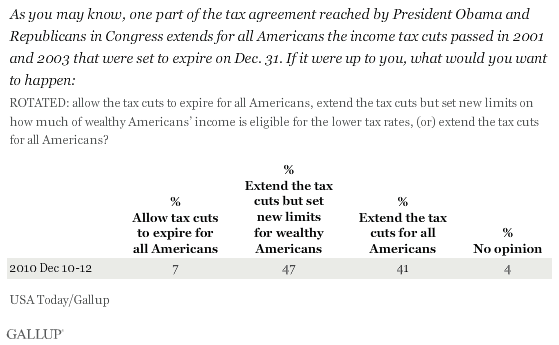PRINCETON, NJ -- Americans, and particularly those who are following the tax issue closely, are substantially more likely to believe Congress should pass the new tax agreement reached by President Obama and Republican congressional leaders than to think Congress should not do so. Among all Americans, 49% support passage, while 32% do not, and support rises to 60% among Americans following the news about the agreement very or somewhat closely.
![Based on What You Have Heard or Read About the Tax Agreement [Reached by President Obama and Republican Leaders in Congress], Do You Think Congress Should or Should Not Vote to Pass It? Among National Adults and by How Closely One Is Following the News About the Agreement, December 2010](http://content.gallup.com/origin/gallupinc/GallupSpaces/Production/Cms/POLL/czjpvw4j0uqy7mepeuhheg.gif)
These results are from a Dec. 10-12 USA Today/Gallup poll. The question asked Americans about "the agreement on taxes reached by President Obama and Republican leaders in Congress last Monday," and did not specify or list the details of what is in the agreement.
Two-thirds (66%) of Americans are following news of the agreement very or somewhat closely. This is modestly above the average 60% of Americans attentive to all news stories in Gallup's database of national news stories measured this way over the past two decades. Republicans, independents, and Democrats are paying essentially the same level of attention.
The new findings in favor of the tax legislation currently under consideration follow a previous Gallup measure of public support for two elements included in the agreement -- extending the 2001 and 2003 tax cuts for all Americans for two years and extending unemployment benefits for the long-term uninsured. Sixty-six percent of Americans favored each.
Some lawmakers who oppose the agreement reached by President Obama and Republican leaders object specifically to the extension of the tax cuts to include the wealthy. The new poll confirms previous Gallup research, suggesting that Americans tilt toward agreement with this argument. When asked "if it were up to you," 47% of Americans would favor extending the tax cuts but setting limits for the wealthy, while 41% would retain the tax cuts for everyone. Few would want them to expire for everyone.

The American public thus appears to be subject to some of the same cross-pressures on this issue that have been evident in the comments of President Obama and other Democratic leaders. The public tilts toward the Obama position that the wealthy should be excluded from the tax-cut extension. But given the choice between extending the tax cuts for all versus letting them expire for all -- which may be the only practical choice if Republican leaders maintain their pledge to hold firm on the issue -- Americans opt for the full extension.
The majority of those who believe the tax cuts should be extended for all support the agreement between Obama and the Republican leaders -- as would be expected. But those who say they would not extend the tax cuts for the wealthy also favor rather than oppose the proposed agreement -- by a 13-percentage-point margin, 49% to 36%.
![Based on What You Have Heard or Read About the Tax Agreement [Reached by President Obama and Republican Leaders in Congress], Do You Think Congress Should or Should Not Vote to Pass It? By Views of Tax Cuts, December 2010](http://content.gallup.com/origin/gallupinc/GallupSpaces/Production/Cms/POLL/ovynjyo04uwp_f3kjmkxva.gif)
Implications
Taken as a whole, the new Gallup data confirm previous findings that overall, the American people support the tax agreement proposed by President Obama and Republican leaders. This is particularly the case among those who are paying attention to the debate. While the question wording used in this USA Today/Gallup poll did not specify what was in the proposed Obama-Republican tax deal, those following it closely are strongly in favor, by a 25-point margin. Among the roughly one in three Americans who say they are not following news about the agreement closely, about half venture an opinion, breaking roughly even on whether Congress should or should not pass the agreement.
The Gallup findings also confirm that Americans tend to mirror the position on the agreement taken by President Obama and other Democrats who support it -- that it is not optimal, but acceptable if the choice is the agreement or nothing. Even those who say tax cuts should be limited for the wealthy tilt toward support of the Obama-Republican agreement.
Survey Methods
Results for this USA Today/Gallup poll are based on telephone interviews conducted Dec. 10-12, 2010, with a random sample of 1,019 adults, aged 18 and older, living in the continental U.S., selected using random-digit-dial sampling.
For results based on the total sample of national adults, one can say with 95% confidence that the maximum margin of sampling error is ±4 percentage points.
Interviews are conducted with respondents on landline telephones (for respondents with a landline telephone) and cellular phones (for respondents who are cell phone-only). Each sample includes a minimum quota of 150 cell phone-only respondents and 850 landline respondents, with additional minimum quotas among landline respondents for gender within region. Landline respondents are chosen at random within each household on the basis of which member had the most recent birthday.
Samples are weighted by gender, age, race, education, region, and phone lines. Demographic weighting targets are based on the March 2009 Current Population Survey figures for the aged 18 and older non-institutionalized population living in continental U.S. telephone households. All reported margins of sampling error include the computed design effects for weighting and sample design.
In addition to sampling error, question wording and practical difficulties in conducting surveys can introduce error or bias into the findings of public opinion polls.
View methodology, full question results, and trend data.
For more details on Gallup's polling methodology, visit www.gallup.com.
